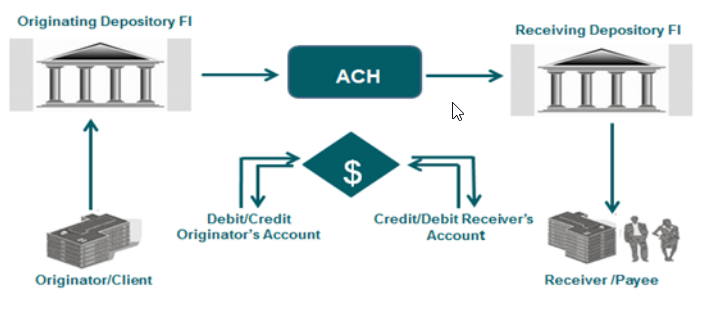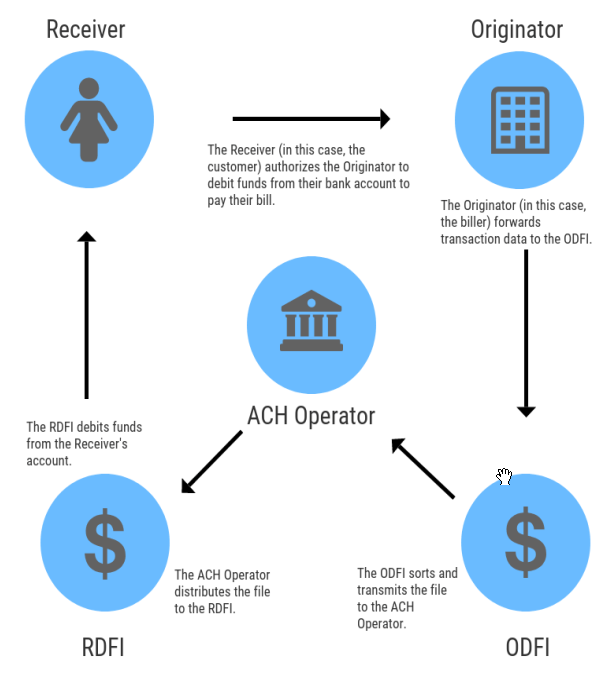ACH
ACH - (Automated Clearing House)
- ACH is an electronic funds transfer system that facilitates the movement of money between bank accounts in the US
- Evolutionary step up from paper checks (conceived in the late 60’s)
- System designed and well suited for repetitive payments like: payroll, mortgage installments, utility payments, etc.
- also called eChecks, direct deposit, direct debit…
- Nacha - National Automated Clearing House Association - is the rule making body
- Mostly low value, but high volume
- Usually free or very inexpensive for both the sender & receiver
- ACH messages are delivered up to 5x a day (06:00, 12:00, 16:00, 17:30, 22:00) <= Eastern
- Same day ACH introduced 2016 - has current per-payment limit of $100k, set to increase to $1M in March 2022
- same day settlement but is not an RTP system…. same day is same day, not real-time
- Considered more secure than a wire.
- Good for US payments only
- Often used by Paypal, CashApp, Coinbase, etc… behind the scenes to transfer funds from user’s bank account to their respective platforms
Quick stats
- Payment volume and value statistics available here, here, and here
- $62 Trillion was processed via the network in 2020
- Volume increasing across payment scenarios, with B2B payments joining the trend (with transactions increasing 15%)
- Pandemic spurring much of adoption of electronic payment solutions => check payments declined more than 23% yoy in Q4, says the Fed.
- Same-day ACH volume spiked 35.7% in 4th Quarter 2020 -> value of transactions spiked 101% <= driven in part by increased B2B usage
Two ACH Transfer Types:
- ACH Credit
- An ACH entry that deposits funds into a Receiver’s account
- Example: payroll direct deposits
- ACH Debit
- An ACH entry that withdraws funds from a Receiver’s account
- Example: any pre-authorized bill pay scenario: mortgage payments, utility or credit card payments, etc.
Definitions:
- Originator: Usually a company that initiates an ACH debit or credit, through an ODFI or Third-Party Sender, to a
Receiver (a consumer or another company)
- Can also be an individual or other entity
- Needs the Receiver’s pre-authorization
- Originator always represents the transaction “initiator” regardless of debit or credit transaction
- ODFI: Originating Depository Financial Institution - usually the originator’s bank
- The entity responsible for converting ACH transactions into a NACHA accepted formatted file and transmitting it to the ACH operator.
- RDFI: Receives the transaction and performs validation of funds availability and account standing.
- Receiver: Company or individual receiving an ACH debit or credit entry from an Originator

General Flow:
- An Originator– whether that’s an individual, a corporation or another entity– initiates either a Direct Deposit or Direct Payment transaction using the ACH Network.
- The Originating Depository Financial institution (ODFI) enters the ACH entry at the request of the Originator.
- The ODFI aggregates payments from customers and transmits them in batches at regular, predetermined intervals to an ACH Operator.
- ACH Operators (two central clearing facilities: The Federal Reserve or The Clearing House) receive batches of ACH entries from the ODFI.
- The ACH transactions are sorted and made available by the ACH Operator to the Receiving Depository Financial Institution (RDFI).
- The Receiver’s account is debited or credited by the RDFI, according to the type of ACH entry. Individuals, businesses and other entities can all be Receivers.
- Each ACH credit transaction settles in one to two business days, and each debit transaction settles in just one business day, as per the Rules.
Example: Workflow for a bill payment

The ACH payment network is really two intertwined systems run by two separate operators:
- EPN - (Electronic Payments Network)
- Operated by The Clearing House (TCH) - a banking association and payments company that is owned by the largest commercial banks.
- Generally services transactions between banks
- FedACH
- Operated by the Federal Reserve Banks
- Generally services transactions involving government related financial institutions
- Same Day ACH
- NACHA proposed fees of $.08, fed actions pushed this down to $.04 => good for end users